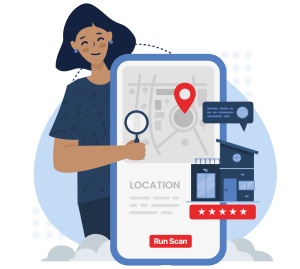Local SEO is critical for businesses that want to attract local customers through local search and maps applications.
In fact, local search results on Google and Google Maps are the biggest sources of organic traffic for local businesses of all different types, from restaurants and retail stores to auto mechanics and dentists.
Because of this, optimizing your Google Business Profile and website for local search should be one of the most important focuses of your overall digital marketing strategy for any business, small or large.
But doing local SEO is a nuanced process that requires a multi-faceted approach, and it's easy to make mistakes along the way. So, make sure you know what some of the most common local SEO mistakes are and how to avoid them to ensure your Google Business Profile shows up in results.
Watch Out for These 10 Local SEO Mistakes and Take Steps To Avoid Them:
- Incomplete Google My Business Profile
- Inconsistent NAP Information
- Ignoring Reviews
- Not Optimizing for Local Keywords
- Neglecting Mobile Optimization
- Ignoring Other Local Listings
- Lack of Location-Specific Pages
- Not Using Google Posts
- Ignoring Local Structured Data Markup
- Not Monitoring Performance
1. Incomplete Google Business Profile
Ensure your Google Business Profile is complete with accurate information, including your business name, address, phone number, and business hours. Select all relevant categories and attributes to help Google rank your listing in as many relevant local search results as possible.
2. Inconsistent NAP Information
NAP (Name, Address, Phone Number) consistency across all online platforms is crucial to maintain strong rankings in local search results. Inaccurate information can confuse search engines and potential customers, making it harder for them to determine the relevance of your business to searches.
3. Ignoring Reviews
Responding to reviews on Google and other platforms, both positive and negative, shows engagement and commitment to the customer experience and can improve your local SEO. Ignoring reviews can harm your reputation and cause your local search ranking to drop.
4. Not Optimizing for Local Keywords
Use local keywords in your website content, meta tags, and Google Business Profile to improve your local search rankings. These should include a mix of different geo-tagged keywords specific to your products and services and the area(s) you offer them in.
5. Neglecting Mobile Optimization
Ensure your website is mobile-friendly, as many local searches are done on mobile devices and Google gives precedence to sites that have good mobile responsiveness and load speeds in local search results.
6. Ignoring Other Local Listings
Besides Google Business Profile, ensure your business is listed on other relevant local directories and websites. Make sure your business information is identical across all these platforms to build consistent local citations that can help boost your local SEO.
7. Lack of Location-Specific Pages
Create location-specific pages on your website if you have multiple locations to improve local search visibility for each location. Since every location should also have a separate Google Business Profile, this also provides you with unique links you can use in the listings to distinguish them as separate entities to Google, which can improve rankings.
8. Not Using Google Posts
Google Posts allow you to share updates, offers, and events directly on your Google Business Profile, improving engagement and visibility and providing more opportunities to include locally relevant keywords on your profile.
9. Ignoring Local Structured Data Markup
Adding local structured data markup to your website can help search engines understand your content better and improve local search rankings. This is an important part of doing technical SEO, one of the different types of SEO that you can use to drive more organic traffic to your site.
10. Not Monitoring Performance
Regularly monitor your local SEO performance using a local rank tracker, like Local Falcon, can help you analyze competitors, spot trends, and identify areas for improvement. Local Falcon allows you to track your ranking for any keyword in any area, down to a hyperlocal targeting level.
By scheduling and running rank tracking scans at regular intervals, you can see how optimizations you make (and other factors, like the competition) are affecting your local SEO performance.
If you use Local Falcon, Falcon AI, the built-in AI assistant, provides near-instant analysis of your listing health and local ranking trends, not to mention laser-focused recommendations for improving your ranking in local search results.
The Bottom Line
So, there you have it, an overview of some of the most common local SEO mistakes and how to avoid them.
Avoiding these common mistakes and taking steps to optimize around them can help you get found in local search results, improve your rankings, and attract more local customers to your business.
Remember to regularly monitor your performance and make adjustments as needed to stay competitive in local search results.
Local Falcon and Falcon AI can take care of much of the local ranking analysis for you, pointing out potential problems with your local SEO that you should take steps to fix right now. So, what are you waiting for? Give Local Falcon a try today!


